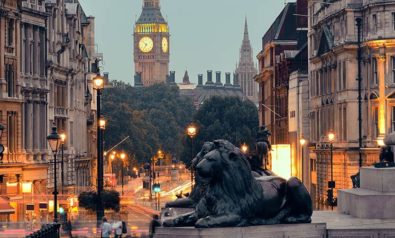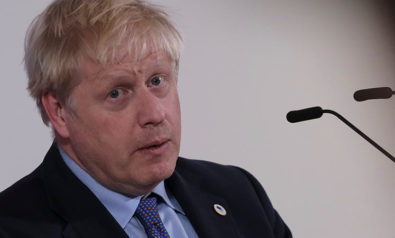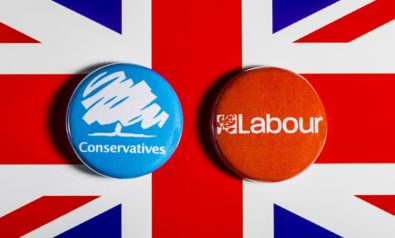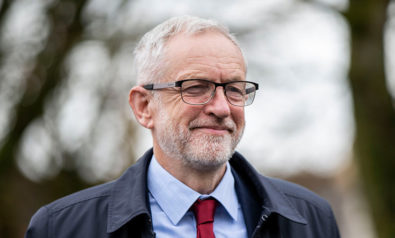Just days before the December 12 election, The Guardian’s opinion poll tracker finds the Tories to “have a significant lead” over Labour even as support for the Liberal Democrats and the Brexit Party has slumped. In recent years, opinion polls have been notoriously unreliable. Rob Watson, the BBC’s UK political correspondent, went on a “mini-election tour” of the United Kingdom and found “plenty of anecdotal evidence” to suggest that Prime Minister Boris Johnson will win this election.
360° Context: Britain Faces a Historic Election
Johnson’s time in 10 Downing Street has been tumultuous. The House of Commons defied him a staggering 12 times, the Supreme Court voted unanimously against his decision to suspend Parliament and his own brother resigned from the cabinet. Johnson kicked out 21 rebel MPs from his own party. They included big beast Ken Clarke, rising star Rory Stewart and Winston Churchill’s grandson, Sir Nicholas Soames. Despite the odds, Johnson has still managed to get a new Brexit deal with the EU. It is this deal that he wants voters to back.
There is method in Johnson’s madness. Both Tory insiders and journalists speak of a Svengali who has cast a spell on the prime minister and masterminded his strategy. Johnson plays the good cop, turning on his legendary charisma, charm, wit, banter and humor. Svengali Dominic Cummings, the founder of “leave” campaign, plays bad cop, marking out victims, putting the knife in and then twisting it. Despised by former Prime Minister David Cameron, Cummings has been called a Tory Bolshevik. While Johnson with his oratory and energy plays Vladimir Lenin, Cummings with his plotting and cunning plays Joseph Stalin.
The Civil War Is Back
As Stewart has observed in a candid interview, Cummings is a Machiavellian operator with a gift for communication in the modern age. “Take back control,” a slogan Cummings created, became a mantra that resonated deeply in an island with a sacrosanct tradition of parliamentary sovereignty and memory of global empire. The red bus calling to spend the £350 million ($461 million) per week the UK sends to the EU on the National Health Service (NHS) instead was political theater of the very highest order.
Johnson and Cummings have been itching for an election from the very day they entered 10 Downing Street. They have pitched themselves as the keepers of the democratic flame who regard the result of the 2016 Brexit referendum as inviolable. They see the “remain” camp as hopelessly fragmented. Jeremy Corbyn’s Labour and Jo Swinson’s Liberal Democrats cannot work together. They will inevitably split the vote, giving the Conservatives a clear path to power.
In this worldview, the Liberal Democrats are now a single-issue pressure group. They are obsessed only with Europe. Led by a “shouty hockey mom,” they lack intellectual ballast of yore when Paddy Ashdown led them with splendid gravitas if not spectacular electoral success. More importantly, the Lib Dems are now an anti-democratic party because they have rejected the result of the Brexit referendum to leave the European Union.
In this worldview, Corbyn’s Labour Party is unelectable. The threatening New Labour project of Tony Blair and Gordon Brown is dead. A Marxist anti-Semite with dodgy friends from Palestine and Northern Ireland is now in charge. Labour has returned to the days of Michael Foot under whom it lurched to the left, allowing Margaret Thatcher to ride her victory chariot to Number 10.
Johnson and Cummings have bet that the Brexit faithful will deliver a Tory majority in the House of Commons on December 12. Therefore, the party had to be purged of “namby-pambies and fuddy-duddies” to win a majority. Learning from Theresa May’s lackluster performance in the 2017 election, Johnson and Cummings are going to the public with a new deal and asking for a majority to “get Brexit done.”
This strategy to swing right to win the election and then move back to the center sounds eminently sensible. However, there is a fly in the ointment. The country is deeply divided. The Conservative Party has morphed into a party of Brexit. It is not quite the broad church it was until recently. A victory on December 12 might well be Pyrrhic because a potential Tory cabinet will inevitably lack some of the party’s best minds.
In fact, the UK has never been so divided since the English Civil War of 1642-51. Labour has emulated the Tories in purging the party of its own heretics. The Corbynistas now control the commanding heights of the party and dream of doing the same with the economy. They want Scandinavian-style socialism and have no time for New Labour apostates. Like the Conservative Party, Labour is now thin on talent and intolerant of dissent.
Along with the two main parties, the rest of the country is divided too. The Scottish National Party (SNP) led by Nicola Sturgeon is campaigning on a simple question: “[W]ho will decide Scotland’s future — Westminster leaders like Boris Johnson or the people who live here?” After a similar vote in 2014, the SNP wants another referendum on the question of Scottish independence because the UK will no longer be in the EU and most Scots voted for “remain.” Johnson, Corbyn and Swinson have all rejected the call for a second Scottish referendum, but this seismic fault line could end the much-vaunted unity of the United Kingdom.
Even as dour Presbyterian Scots may bring future peril, Northern Ireland is already simmering. May’s Brexit deal collapsed in part because of the Irish backstop. This was a special provision of the EU withdrawal agreement that prevented a hard border on the island of Ireland. That question has not gone away. Johnson’s deal is not making the Democratic Unionist Party (DUP), the strident Protestant party of Northern Ireland, terribly happy. Since 2017, the Tories have been in power thanks to DUP support, and a hung parliament might make matters for Johnson’s Brexit deal tricky.
In any case, the peace in Northern Ireland is far more fragile than it seems. The DUP and Sinn Féin, the Catholic party that wants reunification with Ireland, have fallen out. The Good Friday Agreement of 1998 brought peace to this troubled land and envisaged a power-sharing agreement. After the Brexit referendum, the DUP and Sinn Féin have bickered bitterly. Since early 2017, Northern Ireland has had no government because the two parties have been unable to share power. Consequently, major decisions involving millions of pounds and affecting the lives of the people are simply not being made. Nurses are striking, people are restive and the return of violence is a distinct possibility.
The Cavalier Leads the Roundhead
On July 24, this author observed that the history of the UK has long been “a ding-dong battle between cavaliers and roundheads.” Old Etonian Cameron is clearly a cavalier while the vicar’s daughter May is a roundhead. This divide exists even within the Labour Party. Blair was a cavalier while Brown a roundhead. Today, the contrast could not be sharper.
Johnson, the 20th-Old Etonian prime minister, a scholar of classics at Balliol College, Oxford and a £250,000-a-year columnist for The Daily Telegraph, is the classic cavalier. Corbyn, a self-proclaimed democratic socialist, a student who left school with the lowest-possible passing grades and a supporter of underdogs from Latin America to Africa, is a redoubtable roundhead.
Like Thatcher, another roundhead, Corbyn is a conviction politician. The Labour leader opposed selective education and, therefore, did not want his son to attend a grammar school. A frugal vegetarian, an avid gardener and a supporter of unilateral disarmament, Corbyn is a cardholding member of the old guard of the Labour Party. Corbyn’s unlikely rise to power stems from public resentment against George Osborne’s austerity measures that inflicted pain and hardship on the most vulnerable sections of society. In 2017, he did unexpectedly well against May. Now, Corbyn is against a completely different political animal and evidence suggests that he is struggling.
Corbyn’s Achilles’ heel is his lack of clarity on Brexit. There is reason to suspect that Corbyn is a closet Brexiteer. His claim to be “neutral” on Brexit might be forced because his party members lie largely in the “remain” camp. Corbyn is promising to negotiate a third Brexit deal with the EU if he enters Number 10 that will protect trade, jobs and the peace process in Northern Ireland. The trouble for Corbyn is that the country is suffering from Brexit fatigue and wants the protracted political soap opera to end. On Brexit, the issue voters care most about according to opinion polls, the Labour leader has not been able to put daylight between Johnson and himself.
As pointed out earlier, Johnson could not be more different to Corbyn. His own sister describes him as “charming, ruthless, single-minded, determined” and disciplined. Conrad Black, who hired him as editor of The Spectator, has called him “a scoundrel” who is “very clever and very likable” but is really “a sly fox disguised as a teddy bear.” Ian Hislop, the editor of Private Eye, has called the philandering Johnson “our [Silvio] Berlusconi but somehow it’s funnier.”
Like Berlusconi, Johnson is a populist Pied Piper. Like the Italian stallion, he is also “a politician with no convictions.” Clarke, Soames and others who know him well have come to a similar conclusion. Johnson does have preternatural confidence and extraordinary swagger that comes from a deep belief that he was born to rule. Johnson’s sister remarks that the Tory leader knows that “life is a competition and he always wants to be top.” At university, Johnson became president of the prestigious Oxford Union after losing out the first time around. At Eton, he competed so ferociously that he broke his nose four times on the rugby pitch. Even as a young boy, Johnson wanted to be world king. He may be short of conviction but certainly not of ambition.
As Labour’s Ken Livingstone observed after losing to Johnson twice in the London mayoral race, the Old Etonian knows how to make people feel good about themselves. In this election, Johnson’s high energy, cheery, witty style of campaigning seems to be working even with some minorities. With his Diwali greetings, the prime minister has cannily wooed British Indians. To be fair, most British Indians swapped sympathies from Labour to the Conservatives in 2015 after Cameron’s bromance with Indian Prime Minister Narendra Modi. By showing up in a London temple with his partner clad in a sari, Johnson has British Indians singing Bollywood-style devotional ditties in Hindi.
Apart from the “Boris effect,” Tories have a structural advantage that Cummings understands only too well. They have more money than other parties. They are the natural party of power in a class-divided society where people may resent but ultimately defer to their social superiors. Besides, the “leave” camp is less fragmented than the “remain.” Nigel Farage’s Brexit Party not contesting the 317 seats won by the Conservative Party in the 2017 election, and many members of Farage’s party are gravitating toward the Tories. This gives Johnson’s party a huge advantage in the UK’s first-past-the-post system.
In this electoral system, if there are five candidates who win 36%, 30%, 18%, 10% and 6% of the vote in any constituency, the one who wins the most votes — i.e., 36% in this example — becomes MP. Unlike proportional representation, the seats in Parliament are not divided among different parties in accordance with the national percentage of the votes they receive. The party that wins the most seats governs and the Tories are in poll position. The wily cavalier fox seems set to beat the naive roundhead hedgehog, “get Brexit done” and inaugurate a new era in British politics.
The views expressed in this article are the author’s own and do not necessarily reflect Fair Observer’s editorial policy.
Support Fair Observer
We rely on your support for our independence, diversity and quality.
For more than 10 years, Fair Observer has been free, fair and independent. No billionaire owns us, no advertisers control us. We are a reader-supported nonprofit. Unlike many other publications, we keep our content free for readers regardless of where they live or whether they can afford to pay. We have no paywalls and no ads.
In the post-truth era of fake news, echo chambers and filter bubbles, we publish a plurality of perspectives from around the world. Anyone can publish with us, but everyone goes through a rigorous editorial process. So, you get fact-checked, well-reasoned content instead of noise.
We publish 2,500+ voices from 90+ countries. We also conduct education and training programs
on subjects ranging from digital media and journalism to writing and critical thinking. This
doesn’t come cheap. Servers, editors, trainers and web developers cost
money.
Please consider supporting us on a regular basis as a recurring donor or a
sustaining member.
Will you support FO’s journalism?
We rely on your support for our independence, diversity and quality.
















